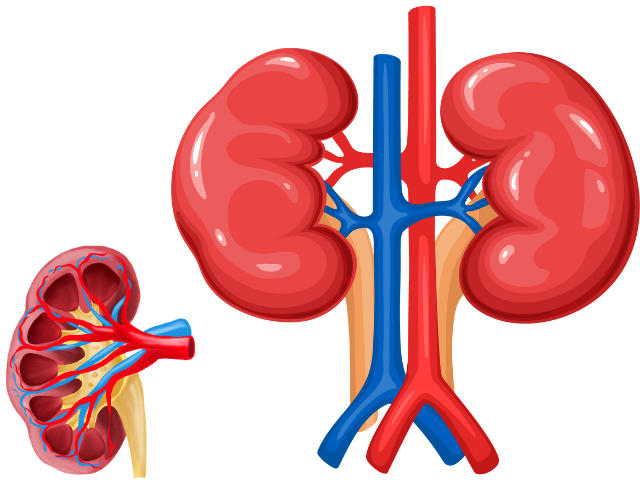Open pyeloplasty is a surgical procedure designed to correct ureteropelvic junction (UPJ) obstruction, a condition where the flow of urine from the kidney to the bladder is blocked. This blockage can lead to kidney swelling (hydronephrosis) and damage over time. At KK Virat Hospital, Karimnagar, we offer advanced open pyeloplasty techniques to relieve obstructions, restore normal urine flow, and protect kidney function.
Understanding the Open Pyeloplasty Surgery
Open pyeloplasty involves a surgical approach where the surgeon makes a larger incision to access and repair the ureteropelvic junction. This approach allows for precise reconstruction, especially in complex cases. It is preferred when minimally invasive techniques are unsuitable.

Who Should Consider Open Pyeloplasty?
Open pyeloplasty is recommended for individuals with the following conditions:
Failed Minimally Invasive Procedures: In cases where laparoscopic or endoscopic treatments have been unsuccessful, open pyeloplasty remains a reliable alternative for complex or recurrent obstructions.
UPJ Obstruction: This condition occurs when the ureteropelvic junction becomes narrowed or blocked, impeding the flow of urine from the kidney to the bladder. Causes may include congenital defects, scar tissue, or external pressure from blood vessels.
Recurrent Urinary Tract Infections (UTIs): Persistent UTIs can result from improper urine drainage, leading to bacterial growth and inflammation. Open pyeloplasty addresses the underlying obstruction to prevent recurring infections.
Severe Hydronephrosis: When urine accumulates in the kidney due to blockage, it causes swelling, which can lead to permanent kidney damage if left untreated. Surgery helps alleviate this condition.
Persistent Flank Pain: Chronic pain in the side or back may be a symptom of urine buildup due to obstruction. Surgery offers a long-term solution by restoring normal urine flow.
Risk Factors for UPJ Obstruction
Certain factors increase the risk of developing UPJ obstruction, such as:
Lifestyle Factors: Smoking, dehydration, and poor dietary habits may indirectly impact urinary tract health.
Congenital Anomalies: Genetic predisposition or family history of urinary tract disorders may increase the likelihood of UPJ obstruction.
Urinary Tract Infections: Frequent or recurrent UTIs can lead to scarring and narrowing of the ureter.
Trauma or Surgery: Injuries or previous abdominal or pelvic surgeries may contribute to ureteral blockage.
Kidney Stones: Chronic or recurrent kidney stones can mechanically block the ureteropelvic junction.
ICD-10 Codes for UPJ Obstruction and Related Conditions
Accurate diagnosis and documentation are essential. Relevant ICD-10 codes include:
N28.89: Other specified disorders of the kidney and ureter, covering a broad range of non-specific conditions.
Q62.11: Congenital obstruction of the ureteropelvic junction, indicating a birth defect causing urine flow issues.
N13.0: Hydronephrosis with ureteropelvic junction obstruction, referring to swelling due to blocked urine flow.
N20.0: Kidney stones or nephrolithiasis, potentially contributing to UPJ obstruction.
Pre-Surgery Care
Proper preparation ensures better surgical outcomes. Pre-surgery care at KK Virat Hospital includes:
Patient Counseling: Detailed discussions about the surgical process, possible risks, expected recovery timeline, and addressing patient concerns to ensure readiness.
Comprehensive Assessment: Imaging tests such as ultrasound, CT scan, or MRI to evaluate the extent and cause of obstruction. These diagnostic tools provide detailed visualization for accurate surgical planning.
Blood and Urine Tests: Laboratory tests to assess kidney function, detect infections, and check for electrolyte imbalances.
Medication Review: Adjusting or temporarily discontinuing medications like blood thinners that may increase the risk of bleeding during surgery.
Lifestyle Guidance: Advising patients on healthy habits, such as smoking cessation, maintaining a balanced diet, and adequate hydration to improve healing potential.
Surgical Procedure Overview
Open pyeloplasty involves several key steps:
Closure: The incision is closed with sutures or staples, followed by dressing and monitoring.
Anaesthesia: Patients are administered general anaesthesia to ensure comfort throughout the procedure.
Incision: A flank or abdominal incision is made to provide direct access to the kidney and ureter.
Repair: The obstructed or narrowed portion of the ureter is removed or reconstructed. In some cases, the ureter is repositioned to prevent future obstruction.
Stent Placement: A temporary ureteral stent may be placed to facilitate urine flow during the healing process.
Post-Surgery Expectations
Patients can expect the following post-operative experiences:
- Hospital Stay: Typically 3-5 days, depending on recovery speed and overall health.
- Pain and Discomfort: Managed with prescribed pain medications.
- Temporary Catheter or Stent: Helps maintain proper urine flow and is usually removed after a few weeks.
- Activity Limitations: Patients should avoid heavy lifting and strenuous activities until cleared by their doctor.
Post-Surgery Care
Post-operative care is crucial for a successful recovery. Recommendations include:
Follow-Up Visits: Regular check-ups to monitor kidney function and remove any temporary stents.
Wound Care: Keeping the surgical site clean, dry, and checking for signs of infection such as redness or discharge.
Hydration: Drinking sufficient fluids to support kidney function and prevent urinary tract infections.
Dietary Modifications: A balanced diet low in sodium and protein to reduce the strain on kidneys.
Activity Guidelines: Avoiding strenuous physical activities and gradually return to normal tasks.
Advantages of Open Pyeloplasty
Open pyeloplasty offers several benefits:
Suitable for Complex Cases: Often preferred for anatomical abnormalities or failed previous surgeries.
High Success Rate: Effective for severe or complex obstructions that fail minimally invasive techniques.
Long-Term Relief: Durable solution with low recurrence rates.
Kidney Function Preservation: Protects against permanent kidney damage by restoring normal urine flow.
Why Choose KK Virat Hospital for Open Pyeloplasty in Karimnagar?
KK Virat Hospital stands out for its commitment to exceptional kidney care. Here’s why patients trust us:
- Expert Surgical Team: Highly skilled urologists with extensive experience in open pyeloplasty.
- Advanced Facilities: State-of-the-art operation theatres and diagnostic equipment.
- Comprehensive Care: From diagnosis to recovery, we offer personalized care tailored to each patient.
- Positive Patient Outcomes: High success rates with minimal complications.
Book Your Appointment Today
If you or a loved one is experiencing symptoms of UPJ obstruction, don’t hesitate to seek expert care. Contact KK Virat Hospital, Karimnagar, today to book an appointment and take the first step toward better kidney health.
- Call Us Directly: Get in touch with our medical coordinators to schedule an appointment with an expert urologist.
- Direct Visit: You can visit our hospital directly by carrying your previous medical records if you have a medical history. However, admission will be based on the doctor’s recommendation.
What is Open Pyeloplasty, and why is it performed?
Open pyeloplasty is a surgical procedure used to correct ureteropelvic junction (UPJ) obstruction — a blockage that prevents urine from flowing properly from the kidney to the bladder. It is performed to relieve symptoms like severe flank pain, recurrent urinary tract infections (UTIs), and hydronephrosis (kidney swelling).
Who is a suitable candidate for Open Pyeloplasty?
Patients with severe or persistent UPJ obstruction, recurring UTIs, kidney swelling (hydronephrosis), or those who have not found success with minimally invasive treatments are ideal candidates for open pyeloplasty.
How is Open Pyeloplasty different from minimally invasive surgery?
Unlike laparoscopic or robotic surgery, open pyeloplasty involves a larger incision that provides better access for complex or recurrent obstructions. It is often recommended when other minimally invasive techniques fail or are not suitable.
What are the common symptoms indicating the need for Open Pyeloplasty?
Symptoms include severe flank or abdominal pain, recurrent UTIs, blood in the urine (hematuria), nausea, vomiting, and hydronephrosis. Persistent symptoms despite medication may necessitate surgery.
What is the recovery time after Open Pyeloplasty?
Recovery time typically ranges from 4 to 6 weeks. Patients usually stay in the hospital for 3-5 days post-surgery and need to avoid strenuous activities for a few weeks.
Are there any risks or complications associated with Open Pyeloplasty?
As with any major surgery, there are potential risks such as infection, bleeding, blood clots, or injury to surrounding organs. However, these risks are minimized with proper care and the expertise of the surgical team at KK Virat Hospital.
What pre-surgery preparations are required for Open Pyeloplasty?
Patients undergo imaging tests like ultrasound or CT scans, blood and urine tests, medication reviews, and lifestyle guidance. Preoperative counselling is also provided to set recovery expectations.
Is a stent placement necessary after Open Pyeloplasty?
Yes, a temporary ureteral stent is often placed to ensure proper urine flow during the healing process. It is usually removed after a few weeks during a follow-up visit.
Why choose KK Virat Hospital, Karimnagar, for Open Pyeloplasty?
KK Virat Hospital offers experienced urologists, advanced diagnostic facilities, personalized care, and a high success rate in treating UPJ obstruction with minimal complications.
How can I book an appointment for Open Pyeloplasty at KK Virat Hospital?
Booking an appointment is simple. Patients can call our helpline, or walk into KK Virat Hospital, Karimnagar, for a consultation with our expert urologists.


